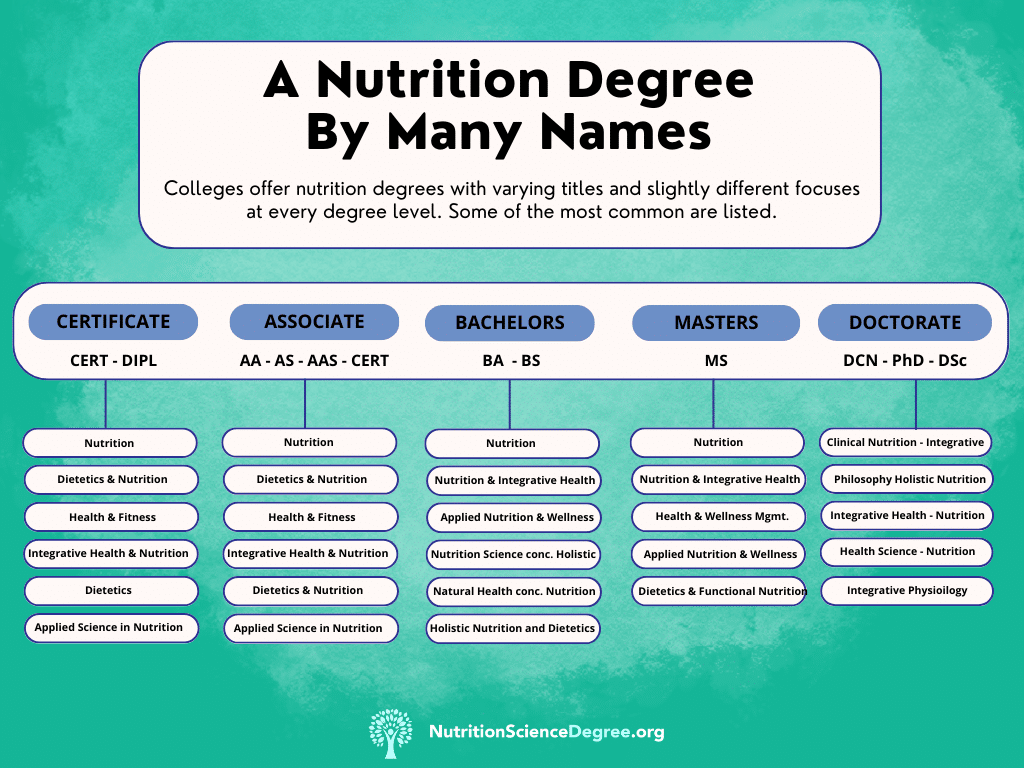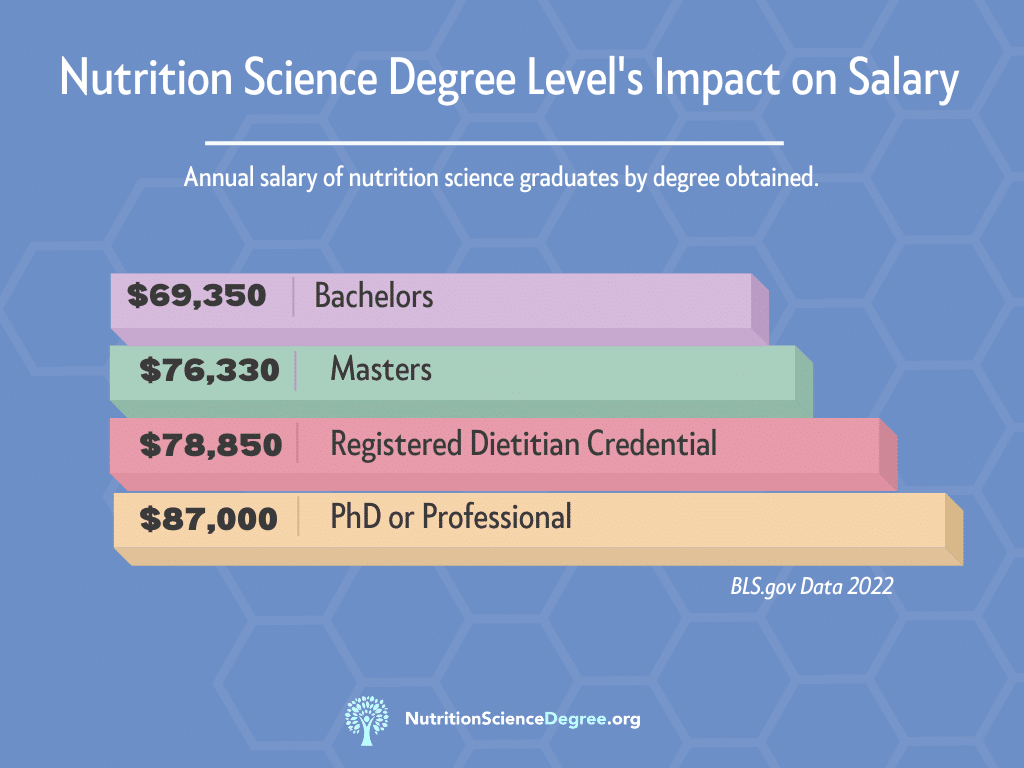
Nutritionist Degrees
More Answers From Nutritionist Degree Graduates
Nutritionist Degree Facts
Median Salary
$69,350
Hourly Rate
$33.32
Range
$39,840 to $88,880
Job Growth (Proj.)
8% per year
Nutritionist Degree Overview
Nutrition Degree Types
To work in a nutrition related career, there are a number of campus and online nutritionist degree programs to choose from at the Associates, Bachelors, Masters, Doctorate and Certificate levels, which each open certain doors for careers. Below is a detailed analysis of the most common nutrition science degree levels, Associates, Bachelors, Masters, and PhD and what careers are available to graduates of each nutrition degree.
Associates in Nutrition
Overview:
An associate’s degree in nutrition science is a two-year program that provides an introduction to the field and covers topics such as nutrition basics, food science, and health promotion.
Common Associates Degree Names:
This degree is offered under a variety of names, each of which indicates a slightly different focus for the degree program, but all of which enable you to enter a career in nutrition. Common associates in nutrition degree names are:
- Associates in Nutrition
- Associates in Dietetics & Nutrition
- Associates in Health & Fitness
- Associates in Integrative Health & Nutrition
- Associates in Holistic Nutrition
- Associates in Applied Science in Nutrition
Associate’s in Nutrition Careers:
Whether on campus or online, this nutrition degree can be a good option for those who want to start working in entry-level positions in the food and health industries.
- Nutrition Assistant
- Dietary Aide
- Health Coach
- Food Service Manager
- Nutrition Educator
Bachelors in Nutrition
Overview:
A bachelor’s degree in nutrition science is a four-year program that provides more in-depth knowledge of nutrition and its effects on the body. This degree covers topics such as metabolism, diet planning, nutrition assessment, and research methods. With a bachelor’s degree, graduates can work in a variety of settings, including hospitals, schools, government agencies, and private practices.
Common Bachelors Degree Names:
Campus and online nutrition degree programs vary in the specific name that they call their nutrition degree program. In some cases, this naming difference indicates a slightly different focus or emphasis for the degree, whereas in others there is no discernable curriculum difference. Common bachelors in nutrition degree names include:
- Bachelors in Nutrition
- Bachelors in Dietetics & Nutrition
- Bachelors in Health & Fitness
- Bachelors in Integrative Health & Nutrition
- Bachelors in Sports Nutrition
- Bachelors in Holistic Nutrition
- Bachelors in Applied Science in Nutrition
Bachelors Level Nutrition Careers:
Commonly called a nutritionist degree, a bachelors in nutrition, offers you the ability to become a nutritionist, enter management level roles, as well as a number of other nutrition related careers. Common careers include:
- Clinical Nutritionist
- Registered Dietitian
- Food Scientist
- Public Health Nutritionist
- Sports Nutritionist
- Clinical Nutrition Manager
Master’s in Nutrition
Overview:
A master’s degree in nutrition science is a two-year program that provides advanced training in the field. This degree focuses on research, clinical practice, and public health, and can lead to more specialized career opportunities. Graduates with a master’s degree can work in research, academia, public health, and management positions.
Common Masters Degree Names:
A campus or online masters in nutrition degree program enables you to pursue leadership positions in the field. A wide variety of nutrition masters degrees are offered, each of which has a different focus depending as reflected in the nutritionist degree program’s name. Common masters degrees in nutrition include:
- Masters in Nutrition
- Masters in Dietetics & Nutrition
- Masters in Health & Fitness
- Masters in Integrative Health & Wellness
- Masters in Sports Nutrition
- Masters in Holistic Nutrition
- Masters in Applied Science in Nutrition
Careers With A Masters in Nutrition Science Degree:
A masters in nutrition degree enables you to pursue a leadership role in all of the bachelors levels fields, plus pursue dietetics, program director roles, and research roles. Some of the most common careers for someone with a masters degree in nutrition include:
- Nutrition Researcher
- Public Health Nutritionist Manager
- Clinical Nutrition Specialist
- Nutrition Program Director
- Nutrition Policy Advisor
Doctoral degree:
Overview:
A doctoral degree in nutrition science is a terminal degree that typically takes three to five years to complete. This degree is designed for individuals who want to pursue careers in research, academia, or advanced clinical practice. Graduates with a doctoral degree can work in research institutions, universities, government agencies, and private practices.
Common Nutrition PhD Degree Names:
A campus or online PhD in nutrition degree program enables you to obtain the highest academic, research and leadership positions in nutrition. A broad range of campus and online PhD nutrition programs are available, with a variety of different degree names, reflecting the diverse range of foci for these advanced degrees. Common doctoral nutrition degrees include:
- PhD in Clinical Nutrition
- PhD in Philosophy of Nutrition
- PhD in Integrativ Philiology
- PhD in Dietetics & Nutrition
- PhD in Health & Fitness
- PhD in Integrative Health & Wellness
- PhD in Sports Nutrition
- PhD in Holistic Nutrition
- PhD in Applied Science in Nutrition
Careers With A Doctorate in Nutrition Science Degree:
A PhD in nutrition degree enables you to pursue a leadership, research or academic role at the highest levels. Some of the most common careers for someone with a doctorate in nutrition include:
- Nutrition Science Professor
- Nutrition Researcher/Scientist
- Clinical Nutrition Director
- Nutrition Policy Consultant
- Food Science Researcher
Degree Level’s Impact On Nutritionist Salary:
Generally speaking, the higher the educational attainment in nutrition science, the higher the salary you will earn. The average salary a nutritionist with a bachelors in nutrition science degree is $69,350, whereas someone with a master’s in nutrition science degree will earn $76,330 on average, an increase of 10%.
- Bachelor’s Degree: Obtaining a Bachelor’s degree in nutrition or a related field is often the minimum requirement for entry-level positions as a nutritionist. With a Bachelor’s degree, nutritionists can expect to earn a median annual salary in the range of $69,350, depending on factors such as experience and location.
- Master’s Degree: Pursuing a Master’s degree in nutrition or a related field can provide advanced knowledge and specialization opportunities, leading to higher-paying positions. Nutritionists with a Master’s degree may earn a median annual salary ranging $76,330
- Registered Dietitian (RD) Credential: Becoming a Registered Dietitian, which requires completing an accredited dietetics program, supervised practice, and passing a national examination, can significantly impact earning potential. RDs often command higher salaries and have more career opportunities. RDs can earn a median annual salary in the range of $78,850.
- Doctorate (Ph.D.) or Professional Degree: Pursuing a doctoral degree, such as a Ph.D. in Nutrition or a related field, or obtaining a professional degree, such as a Doctor of Clinical Nutrition (DCN), can lead to career advancement and higher salaries. Nutritionists with a Ph.D. or professional degree may earn a median annual salary exceeding $87,000, and some may even earn six-figure salaries.
What Our Experts Say About Online Nutrition Degree Programs
I have found just through my career path and journey that moving into more of a freelance independent contract I can charge significantly higher rates working with private practice entities than I could working for a hospital or a nursing home.

Nutrition allows you to work for a hospital or in the community or work for the government or school or for yourself, and that really kind of expands the salary range for it. Today, you’re probably looking at $50,000 to $90,000 for most clinical types of jobs, maybe food service jobs. That goes up with more experience, if you have a master’s degree, if you have your RDN all impact nutrition salary.

Nutrition science salary really varies depending on where you’re working in the country. If you’re in a rural area that maybe doesn’t have many hospitals or many food production plants … you’re not really going to get near that higher end of compensation. If you’re working in an area that has a lot of medical centers, and that has a lot of safe food production plants you can definitely earn more in the $90,000 to $120,000 area.







